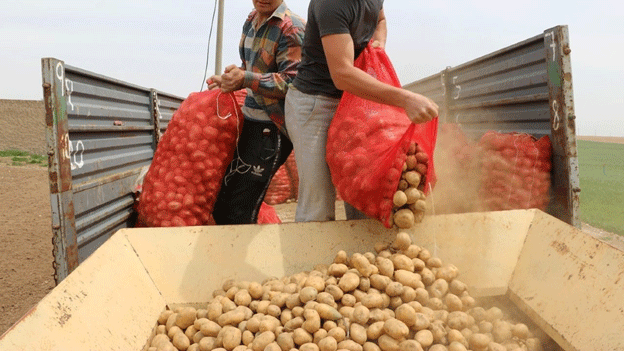According to data from the Turkish Statistical Institute (TÜİK), potato production in Turkey is forecasted to increase by 14% in 2024, reaching 6.5 million tons. Yet, despite the abundance of the crop, many farmers are struggling to make ends meet. The lack of production planning, soaring input costs, and market saturation are putting potato farmers, particularly in regions like Niğde, Nevşehir, and Konya, in a precarious financial situation.
The Production Dilemma: Record Harvest but No Buyers
While the official estimates show a significant increase in production, reports from the field indicate that potato planting has far exceeded these figures. Many farmers, especially in the Central Anatolia region, have planted crops that are not fully registered in the Farmer Registration System (Çiftçi Kayıt Sistemi), meaning actual production may be even higher.
Without proper planning or coordination, this unregulated expansion in potato acreage is now causing a supply glut, with farmers unable to sell their produce at profitable prices. As one farmer remarked, “There is no production planning, so too many potatoes have been planted this season. Both domestic and export markets are saturated, leaving us with unsellable stock.”
Costs of Production vs. Market Realities
The gap between production costs and market prices is a major concern for farmers. Currently, the price of potatoes in the field ranges from 4 to 6 TL per kilogram, depending on quality and variety. However, farmers are quick to point out that these prices do not cover their expenses. “Our costs are extremely high,” says a farmer from Niğde. “For potato farming to be sustainable, we need a selling price of at least 8-9 TL per kilogram. Right now, market prices are below our costs, putting us in a position where we are selling at a loss.”
According to data collected from farmers across different regions, input costs such as seeds, fertilizers, and fuel have all risen significantly over the past year, squeezing profit margins even further. As a result, many potato farmers are now worried about the upcoming harvest of storage potatoes, or “depoluk patates,” which is set to begin in a few weeks. If prices fall further as expected, the financial strain will only worsen.
A Need for Urgent Action: Export and Domestic Consumption
Farmers are calling for immediate intervention to mitigate the losses. Increased exports are seen as a critical solution, but the logistics of opening new export markets in time to absorb this year’s surplus remain challenging. Some farmers have suggested that boosting domestic consumption could help offset the supply surplus. However, without a concerted national effort, such initiatives may not be enough to significantly change the market dynamics in the short term.
The Ministry of Agriculture has also been called upon to step in with subsidies, storage solutions, or financial aid to help farmers weather the current crisis. Without intervention, many farmers may be forced to cut back on planting next year, potentially disrupting future potato supplies and creating long-term instability in the sector.
Planning Is Key to Sustainable Agriculture
The challenges facing potato farmers in 2024 highlight a critical issue in Turkey’s agricultural sector: the need for better production planning. While bumper harvests may appear to be a sign of success, without a coordinated approach to balancing supply with demand, farmers are left to bear the brunt of market imbalances. As Turkey’s potato farmers face significant financial losses this season, urgent measures are needed to stabilize prices, boost exports, and increase domestic consumption. More importantly, the agricultural sector must adopt a more structured approach to crop planning to avoid such crises in the future.







